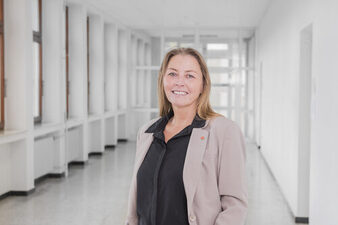About the project
Starting point
Energy production from renewable sources such as wind and solar is dynamic and therefore requires storage systems with an equally dynamic response behavior. Polymer electrolyte membrane (PEM) water electrolysers are likely to be particularly suitable for the decentralized long-term storage of surplus energy from renewable sources. However, cost-intensive precious metal catalyst materials are generally required for production. In order to reduce costs and at the same time increase energy storage using water electrolysis, research is currently focusing on the use of polymer membranes as the basis for alkaline water electrolysis (AEMWE), in which non-precious metal catalysts and titanium-free electrodes are used.
ruhrvalley solution
In the ruhrvalley project AEMruhr, the partners are researching and working on developing and testing an AEMWE system based on hydraulic cell pressing. This patented technology is used to connect new types of cell components to form an electrolyser stack with increased power density.
In hydraulic pressing, the individual cells are surrounded by flexible pockets that are completely surrounded by a hydraulic fluid. All cell components are pressed together homogeneously under pressure. In this way, any number of cells with any active cell surface can be implemented. The capacity of such systems is therefore variable and can be adapted to the different requirements of decentralized use.
In the AEMruhr project, the principle of hydraulic compression is combined with an alkaline membrane in order to combine the advantages of the innovative stack concept with the benefits of alkaline electrolysis. By eliminating the need for rare and expensive precious metal materials such as platinum and, above all, iridium, alkaline electrolysis offers the potential for cost-effective hydrogen production. For use in decentralized operation in combination with renewable energy sources, however, this technology only becomes attractive through the use of appropriate membranes due to the required dynamics.
The aim of the project is to build an alkaline membrane electrolyzer with an output of 50 kW. This demonstrator will be designed for decentralized use and can later be controlled centrally. For this purpose, the decentralized AEMWE systems are connected to a virtual load via special hardware modules, smart device controllers. By combining decentralized AEMWE systems, their functionality can be fully exploited.
All the information required to form a virtual load is transmitted to the platform asynchronously based on messages. The platform links the individual electrolysers to form a whole, whereby the individual power consumption and the total output are clearly displayed in the form of a dashboard. It is also possible to control individual decentralized electrolysers via setting options on the platform. A simple example would be switching the electrolysers on or off.
Key aspects
- Alkaline membrane electrolysis
- Hydraulic single-cell compression
- High-pressure electrolysis
- Decentralized hydrogen production
- Microservice architecture
- Model-driven software development
- Smart energy load management
Sponsor
Federal Ministry of Education and Research (BMBF)
Funding code
13FH0I61IA
Cooperation/project partners
- Fachhochschule Dortmund
- Westphalian University of Applied Sciences Gelsenkirchen
- Evonik Creavis GmbH
- Emscher Lippe Energie GmbH
- QuinScape GmbH

